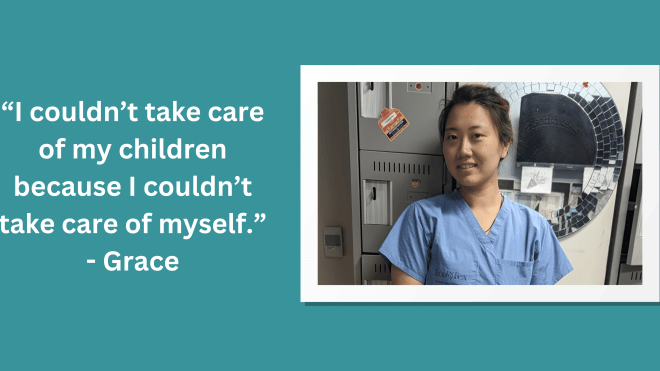
My reaction to the first intake call was anxious, curious, and prepared for disappointment.
I’d tried Cognitive Behavioural Therapy (CBT), Tapping, and Mindfulness-Based Stress Reduction (MBSR) in the past, but they didn’t help with my PTSD symptoms. EMDR (Eye Movement Desensitization and Reprocessing) helped a lot, but my symptoms persisted. As a result, I wasn’t going to get too excited about the Cognitive Processing Therapy that Ontario Shores was offering.
Fatima, my counsellor, spent a few months with me during the pre-assessment phase. Because the COVID-19 pandemic had just begun, all of our sessions were virtual and lasted about one hour per week. Fatima was clear in her explanation of the process, and she eagerly and patiently answered all of my questions. Despite the fact that she had a lot of assessment work to do, Fatima always made time to check in with me to see how my week was going. The procedure was not hurried, nor was it long and tedious. Every week, I looked forward to our phone calls.
I quickly learned to put my trust in Fatima. So, when she enthusiastically expressed her optimism for the group therapy method, I took a leap of faith and signed up for it, despite the fact that I really didn’t want to be with other people.
I spent a few months in group therapy, virtually, for an hour and a half each week with a wonderful group of women just like me. Fatima and a psychotherapist named Scott both demonstrated such compassion, kindness, understanding, love, respect, and expertise during the sessions that I felt both safe and lifted throughout.
It was a huge relief to learn that we didn’t have to share specifics about our traumas in group therapy. Instead, we concentrated on understanding what trauma is and how to work around it by utilizing the tools that were made available to us.
Each week, we had homework/assignments to complete. I wasn’t sure how this was going to help, and I had my doubts, but I trusted Fatima and Scott enough to keep going.
During the post-assessment phase with Fatima, I discovered that prior to therapy, I had “severe” PTSD symptoms as well as high levels of depression and anxiety; however, post-therapy, I had no PTSD symptoms, no depression symptoms, and only mild anxiety. It’s a miracle, in my opinion. I'm thankful for Cognitive Processing Therapy (CPT), the Ontario Government for covering the costs, the women in my group, and Fatima and Scott.
Today, I continue to use the CPT tools which complement the help I’m receiving from other resources. And my life continues to get better and better!
This story originally appeared in the 2021/22 Annual Report.



